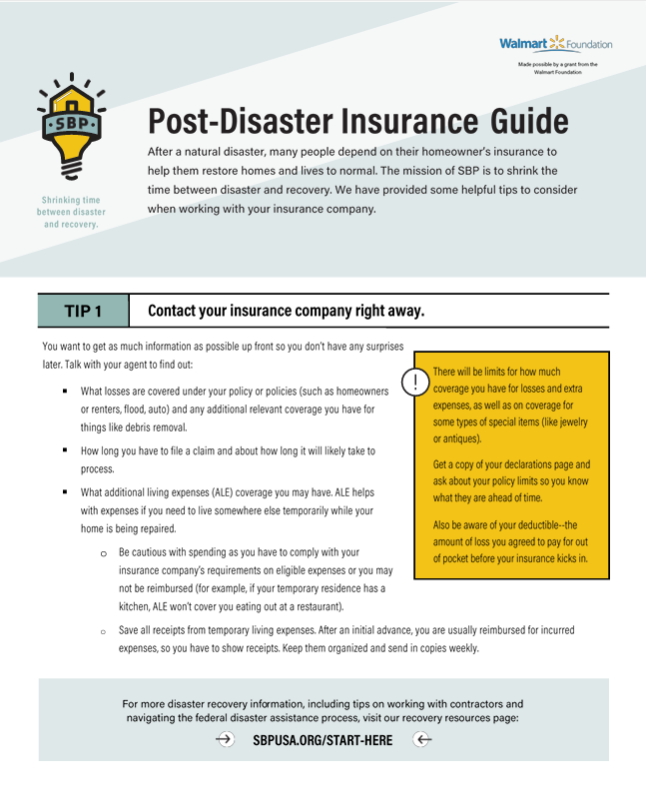Before the storm
Below you’ll find preparation and recovery resources. Hurricane season is June 1-Nov. 30.
Hurricane preparedness checklist
- Check out FLASH Hurricane Strong for do-it-yourself ways to strengthen your homes against flooding, high winds, and lightning.
- Make/update your plan:
- Review your family preparedness plan.
- Establish a family communications plan.
- Have a family evacuation plan in place.
- Assemble or replenish a hurricane survival kit or review your hurricane supply list.
- Secure your property:
- Trim trees and shrubs around your home so that they are more wind-resistant.
- Clear loose and clogged rain gutters and downspouts.
- Reinforce garage doors so wind doesn’t enter and cause structural damage.
- Bring in outdoor objects (furniture, toys, tools, etc.), anchor objects that cannot be brought inside, and remove outside antennas.
- Listen to a NOAA weather radio or TV for updated information.
- Keep valuables and important documents with you in a waterproof container. Consider scanning and sending copies of documents to yourself via email so that you have an electronic version available after the storm.
- Turn off utilities if instructed to do so. Turn the refrigerator thermostat to its coldest setting, and keep its doors closed. If you suspect flooding, duct tape your refrigerator shut.
- If electricity is lost, turn off appliances to avoid power surge when electricity is restored.
- Fill the bathtub and other large containers with water to ensure a supply for sanitary purposes.
- If necessary, take refuge in a small interior room (closet/hallway/bathroom) on the lowest level and away from windows and glass doors.
Before and during the storm
Here’s some guidance on working with your home insurance company, as well as where to find county and city updates, apply for financial assistance, and additional services, including food and housing assistance and mental health support.
 Homeowners insurance guide:
Homeowners insurance guide:
If your home sustained storm-related damage:
- Please reach out to your insurance company or agent as soon as possible. (Don’t know who your insurance provider is? Reach out to your mortgage holder to get their information.)
- Document the damage with detailed photos, video, and a list.
- Once the damage is documented, make emergency repairs to prevent further damage.
- Keep all receipts related to the repairs.
- For more information, review SBP’s Post-Disaster Insurance Guide
- SBP also has resources that provide easy, actionable steps to mitigate risk and prepare for disaster and navigate a prompt, predictable recovery. Visit the hurricane recovery page for tools in English and Spanish on:
- Navigating disaster assistance
- Protect yourself from contractor fraud
- Mold remediation guide
- Muck and gut guide
- Navigating FEMA and the SBA process
- SBP also has resources that provide easy, actionable steps to mitigate risk and prepare for disaster and navigate a prompt, predictable recovery. Visit the hurricane recovery page for tools in English and Spanish on:
County and city updates:
Find information on trash/storm debris pickup, water alerts, school and park closures, power outages, and more.
Home Cleanup:
- Crisis Cleanup Hurricane Ian Home Cleanup Hotline: 800-451-1954. Call to be connected with local volunteer organizations that can help with things like fallen trees, drywall, flooring, appliance removal, tarping roofs, and mold mitigation.
- Asbestos and Natural Disasters Guide from The Mesothelioma Center, an Orlando-based organization that is dedicated to raising awareness to asbestos exposure, covers important information such as:
– How Asbestos is a Risk During a Natural Disaster
– What to Do During Wildfires
– What to Do During a Hurricane
– How to Prevent Asbestos Exposure from Other Disasters
Financial assistance:
- Hurricane Recovery Fund through United Way of Central Florida
- Fannie Mae’s Disaster Response Network™ can help eligible homeowners navigate the broader financial impacts of disaster and the challenging recovery process with a team of HUD-approved housing counselors offering:
- A needs assessment and personalized recovery plan
- Help requesting financial relief from FEMA, insurance, mortgage servicers, and other sources
- Web resources and ongoing guidance from experienced disaster relief advisors
- Apply for federal assistance through FEMA
- Watch a short video detailing 3 ways to apply for assistance:
- Disaster Unemployment Assistance is available for those whose income was affected by Hurricane Ian. For more information visit Disaster Unemployment Assistance – FloridaJobs.org or call 800-385-3920. Customer service representatives are available Monday through Friday from 7:30 a.m. to 6:30 p.m. ET.
- Disaster Legal Services provides free legal help to low-income disaster survivors. Call the hotline at 866-550-2929 any time and leave a message.
- Visit FloridaDisaster.org/info for Hurricane Ian information.
- Floridians who want to volunteer can visit Volunteer Florida’s webpage.
- The Division of Consumer Services can answer insurance questions at 877-693-5236, 9 a.m. – 5 p.m. ET.
Service referral databases
-
- Services – My Florida My Family: Search and connect to support such as financial assistance, food pantries, medical care, and other free or reduced-cost help.
- 2-1-1: Heart of Florida United Way provides food and housing assistance, mental health and suicide prevention, family support services, and health and wellness
- Neighborhood Centers for Families (NCF): one-stop centers that provide Orange County residents with counseling programs, tutoring, employment skills, case management, senior activities, limited health services, and more at 13 locations.
We will continue to update this page with resources. If there is a local resource not listed here yet, please email it to jbabcock@habitatorlandoosceola.org

Recent Comments